The Bible Speaks Today | BST: New Testament (22 vols.)
Digital Logos Edition
Overview
The Bible Speaks Today series has been widely acclaimed for its combination of scholarship and application. Now these bestselling New Testament commentaries are made available in electronic form. All who preach and teach the Word of God, or who want to study it earnestly, will benefit from these superb studies and the technology that now supports them.
Originally published in 1968, the first title in the series was John Stott's The Message of Galatians. It went on to become an incredibly beloved commentary, providing "excellent models for expository preachers, combining clarity of communication with careful exegesis, theological literacy and wise application. But they have also been eminently devotional," said Derek Tidball, series editor of the companion Bible Speaks Today Themes series. In the years since this series was first launched, more than one million copies have been sold of the Old and New Testament volumes.

- All twenty-two New Testament volumes of the BST series
- Applies the truth of Scripture to everyday life in the contemporary world
- Engages a variety of readers with accessible, nontechnical language
- Analyzes the flow of thought in passage-by-passage exposition of New Testament books
- Provides insightful treatment of key themes
The BST series, now complete, covers all sixty-six books of the bible (Old and New Testaments) in fifty-five volumes. If you preach or teach from Scripture, the Bible Speaks Today series will help you apply the timeless biblical message to the everyday experiences of your listeners. And if you study the Bible on your own, these volumes will be a helpful resource focusing on the significance of God's Word for your own life and work..
The Bible Speaks Today series, according to John Stott, is characterized by the following threefold ideal:
- Expound the Biblical Text with Accuracy
- Relate it to Contemporary Life
- Make it Readable
The equivalent print editions in this collection of commentaries are over 5,700 pages. And now, with Logos Bible Software, you can search every page for a passage or topic in only seconds.
These volumes are models of fruitful exposition.
J. I. Packer, Board of Governors’ Professor Emeritus, Regent College, Vancouver, B.C.
Represents first-quality biblical scholarship from an evangelical perspective.
Preaching Magazine
Popular and useful for every pastor, teacher and thoughtful believer.
Southwestern Journal of Theology
- Title: The Bible Speaks Today New Testament (22 vols.)
- General Editors: John Stott and J. A. Motyer
- Series: The Bible Speaks Today
- Publisher: IVP
- Volumes: 22
- Pages: 5,777
This title is included in the following collections
You can save when you purchase this product as part of a collection.
Logos 8 Anglican Bronze Legacy...
$89.99$89.99Logos 7 Anglican Bronze Legacy...
$89.99$89.99Logos 9 Anglican Bronze Legacy...
$89.99$89.99Logos 8 Anglican Silver Legacy...
$349.99$349.99
- $349.99
- $349.99
- $349.99
- $349.99
- $734.46$586.99
- $1,104.24$827.99
- $849.99
- $849.99
- $849.99
- $849.99
- $849.99
- $849.99
- $849.99
- $849.99
- $849.99
- $849.99
- $849.99
- $849.99
- $1,499.99
- $1,499.99
- $1,499.99
- $1,499.99
- $1,499.99
- $1,499.99
- $1,499.99
- $1,499.99
- $1,499.99
- $1,499.99
- $1,499.99
- $1,499.99
- $3,285.79$2,399.99
- $2,999.99
- $2,999.99
- $2,999.99
- $2,999.99
- $2,999.99
- $2,999.99
- $2,999.99
- $2,999.99
- $2,999.99
- $2,999.99
- $2,999.99
- $4,749.99
- $4,749.99
- $4,749.99
- $4,749.99
- $4,749.99
- $4,749.99
- $4,749.99
- $4,749.99
- $4,749.99
- $11,399.99
- $11,399.99
- $11,399.99
- $21,749.99
- $24,999.99
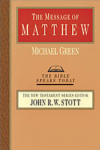
The Message of Matthew
- Author: Michael Green
- Publisher: IVP
- Publication Date: 2001
- Pages: 343
Matthew's Gospel is the first—and perhaps the most important—single document of the New Testament. In it you will find the fullest and most systematic account of the birth, life, teaching, death and resurrection of the founder of Christianity, Jesus the Messiah. In this Bible Speaks Today volume, Michael Green shows how this very Jewish Gospel portrays the power and purpose of Jesus' life and work, which was to bring light to all nations.
Green offers introductory material on the author of Matthew, the readers to whom the Gospel was originally written, the popularity of the Gospel, its structure and themes, and recent scholarship focused on Matthew. He then provides a passage-by-passage exposition of Matthew, paying attention to the application of the text as well as its interpretation. A study guide follows the exposition and will help you to further ponder and practice what this Gospel teaches you about Jesus and your place in the kingdom of Heaven.
Michael Green is chaplain for the Oxford Centre for Christian Apologetics, and also teaches the evangelism module there.
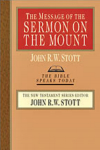
The Message of the Sermon on the Mount
- Author: John Stott
- Publisher: IVP
- Publication Date: 1985
- Pages: 238
"The followers of Jesus are to different," writes John Stott, "different from both the nominal church and the secular world, different from both the religious and the irreligious. The Sermon on the Mount is the most complete delineation anywhere in the New Testament of the Christian counter-culture. Here is a Christian value-system, ethical standard, religious devotion, attitude to money, ambition, lifestyle, and network of relationships—all of which are totally at variance with those in the non-Christian world. And this Christian counter-culture is the life of the kingdom of God, a fully human life indeed but lived out under the divine rule."
In this careful exposition of Jesus' Sermon on the Mount, John R.W. Stott accurately expounds the biblical text and relates it to life today. Above all, the author says, he wants to let Christ speak this sermon again, this time to the modern world.
John Stott is known worldwide as a preacher, evangelist and communicator of Scripture. For many years he served as rector of All Souls Church in London, where he carried out an effective urban pastoral ministry.
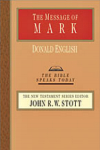
The Message of Mark
- Author: Donald English
- Publisher: IVP
- Publication Date: 1992
- Pages: 254
The fast-paced vitality of Mark's narrative of Jesus wins the hearts of modern readers on its own terms. (No small achievement for a Greco-Roman biography of an ancient sage.) And like any great story, it unveils its meaning to those who listen attentively, who inquire patiently and who brood on its meaning and significance.
Donald English has lived with Mark's story for a long time. He has now written a wise, welcoming and nontechnical guide to the narrative and the message of this smallest of the four Gospels. Whether gazing over the Evangelist's shoulder, or taking the actor's stance or adopting the audience's perspective, he writes as one who loves and understands the story. And he writes as one who has a passion to help others appreciate Mark's portrait of Jesus—Son of Man and Son of God.
Donald English was general secretary of the Division of Home Mission for the Methodist Church in England and chairman of the World Methodist Executive Committee. A well-known speaker, he was twice president of the Methodist Conference in England.
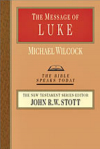
The Message of Luke
- Author: Michael Wilcock
- Publisher: IVP
- Publication Date: 1984
- Pages: 215
Luke knew exactly what he was doing when he wrote his Gospel. He tells us his goal in the opening verses: to set forth an orderly and accurate account of what had been accomplished by the life and teaching of Jesus Christ. In this up-to-date exposition, Michael Wilcock gives special attention to these opening words. Then, as he examines the individual deeds and sayings of Jesus, he shows how the structure of Luke's narrative brings out their meaning.
The good news of Luke is still true today. No one is beyond redemption unless he chooses to put himself there. This message has implications not only for our personal lives but for our churches and for society as a whole.
Michael Wilcock was formerly director of pastoral studies at Trinity College, Bristol. He has now also retired from many years of pastoring churches in the United Kingdom, most recently St. Nicholas' Church, Durham.
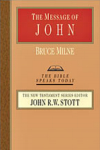
The Message of John
- Author: Bruce Milne
- Publisher: IVP
- Publication Date: 1993
- Pages: 352
John the disciple of Jesus had known the Word of God incarnate. John the pastor and evangelist had contemplated the meaning of that unique person and event. Through the eyes of faith John retells the story of the Word, drawing out its meaning for his contemporaries so that they "might come to believe that Jesus is the Messiah, the Son of God" and "have life in his name."
True to his mentor, the Fourth Evangelist, Bruce Milne has a passion for passing on this Word and helping others respeak it. As Milne puts it, "The mystery of Jesus Christ is the theme of this gospel; always beyond us, yet always summoning us to explore it more fully."
Bruce Milne was pastor of First Baptist Church in Vancouver, Canada, for many years. Today he travels the globe, preaching, teaching, and encouraging pastoral leaders.
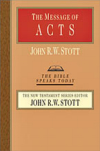
The Message of Acts
- Author: John Stott
- Publisher: IVP
- Publication Date: 1994
- Pages: 428
The Message of Acts was recipient of the 1991 Christianity Today Readers’ Choice Award.
The Spirit moves the church into the world. That is how it has always been since the day of Pentecost when the Spirit brought thousands from many countries into the body of Christ. With the breadth and scholarly care that have marked John Stott's years of ministry, this book opens to us the early days of the church as recorded by Luke in the book of Acts.
The experiences of the early church have much to say about issues that concern Christians today. What can Acts tell us about tongues and other extraordinary manifestations of the Spirit? How should churches structure themselves--with elders, deacons, pastors or all three? What should a normal Christian conversion look like? And, of course, how should the church reach out into the world with the message of salvation?
These and many other topics are handled with a pastoral heart and an unwavering commitment to the authority of God's Word in our lives. As Stott concludes, "The Acts of the Apostles have long ago finished; the acts of the followers of Jesus will continue until the end of the world."
John Stott is known worldwide as a preacher, evangelist and communicator of Scripture. For many years he served as rector of All Souls Church in London, where he carried out an effective urban pastoral ministry.

The Message of Romans
- Author: John Stott
- Publisher: IVP
- Publication Date: 2001
- Pages: 432
John Stott joins a chorus of distinguished voices of the church who have pondered and lived the great themes of Romans, and who have tuned our ears to hear its rich harmonies and meditate on its broad vision. In the classic tradition of great Christian leaders who have commented on Romans, Stott expounds Paul's words, themes and arguments. The power of the gospel, the righteousness of God revealed from heaven, is clearly addressed to today's men and women who have answered its summons.
Not only is Stott deeply acquainted with the text and context of Romans, he is also conversant with the most recent Pauline scholarship. Even more important, he views Romans from his own pastoral and missionary perspective, an outlook shaped in turn by the great vision of the apostle. Here is a commentary for those who live on the edge of the third millennium, a commentary spanning the two worlds of Romans—Paul's and ours.
John Stott is known worldwide as a preacher, evangelist and communicator of Scripture. For many years he served as rector of All Souls Church in London, where he carried out an effective urban pastoral ministry.
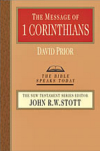
The Message of 1 Corinthians
- Author: David Prior
- Publisher: IVP
- Publication Date: 1985
- Pages: 311
Snobbishness, factionalism, insensitivity to other believers, doctrinal looseness and over-exuberance all flourished in the Corinthian church. When the apostle Paul heard about the difficulties, he was grieved because he had founded the church and felt closely tied to it. He therefore wrote an intense and pointed letter.
In this fresh and gripping exposition of 1 Corinthians, David Prior plainly shows the relevance of Paul's letter for our times. His hope is that all churches may better live out the lordship of Christ in today's cosmopolitan world.
David Prior has pastored churches in Cape Town, South Africa, and Oxford, England, and has served as director of The Centre for Marketplace Theology in London.
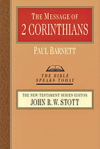
The Message of 2 Corinthians
- Author: Paul W. Barnett
- Publisher: IVP
- Publication Date: 1988
- Pages: 188
The letter of 2 Corinthians is important, Paul Barnett believes, for its magnificent message that God's power is brought to people in their weakness, not in human strength.
This momentous theme emerges in a dramatic real-life situation. The apostle confronts shadowy opponents who had recently come to Corinth and formed an alliance with some of the church leaders and members. His letter is a fascinating record of that conflict.
Paul W. Barnett was until his retirement Anglican bishop of North Sydney, Australia. He remains a visiting fellow in ancient history at Macquarie University (Sydney, Australia) and research professor at Regent College (Vancouver, British Columbia). He has written several books
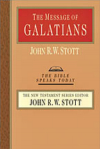
The Message of Galatians
- Author: John Stott
- Publisher: IVP
- Publication Date: 1984
- Pages: 204
To enclaves of young converts tucked away in the mountains of Asia Minor, Paul wrote what is perhaps the oldest document in the New Testament--the letter to the Galatians. What problems were they facing?
Among a variety of religious authorities espousing different teachings, how were they to know who was right? How were men and women to be put right with God? How could Christians in the midst of a pagan culture live lives truly pleasing to God?
'Only one way—' answered Paul, 'through Jesus Christ.' His answer holds true for us as well. The details of our struggle have changed since Paul's day, but the principles he sets forth are as timeless as the Lord he exalts.
In this book John Stott helps us to understand and apply the message of Galatians in the face of contemporary challenges to our faith.
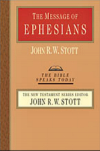
The Message of Ephesians
- Author: John Stott
- Publisher: IVP
- Publication Date: 1984
- Pages: 311
Millions have caught Karl Marx's vision of a New Man and a New Society. "Paul presents a greater vision still," writes John Stott. In his letter to the Ephesians the apostle "sees the human predicament as something even deeper than the injustice of the economic structure and so propounds a yet more radical solution. He writes of nothing less than a 'new creation.'"
John Stott expounds Paul's theme of uniting all things in Christ by uniting his church and breaking down all that separates us from God, one ethnic group from another, husband from wife, parent from child, master from slave. A book for all who want to build the church into the new society God has planned it to be.
John Stott is known worldwide as a preacher, evangelist and communicator of Scripture. For many years he served as rector of All Souls Church in London, where he carried out an effective urban pastoral ministry.

The Message of Philippians
- Author: J. Alec Motyer
- Publisher: IVP
- Publication Date: 1984
- Pages: 234
If you were in jail, what sort of letter would you write to your Christian friends? Would it focus on the difficulties—the poor food, cramped quarters and lonely isolation?
Paul's letter to the Philippians, written from prison, has no hint of self-pity. The letter radiates joy—joy that Christ was proclaimed, joy in fellowship with the Philippian Christians and, above all, joy in Jesus himself.
In this volume of the Bible Speaks Today series, Alec Motyer identifies three major themes that filled Paul's heart and mind as he wrote: the unity of the church, the person of Jesus and what he has achieved, and the call to live a life worthy of the gospel.
J. Alec Motyer (M.A., B.D., D.D.) was formerly principal of Trinity College in Bristol, England. He has extensive experience in parish ministry and is well known as a Bible expositor.
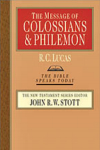
The Message of Colossians & Philemon
- Author: R.C. Lucas
- Publisher: IVP
- Publication Date: 1984
- Pages: 191
Fullness and freedom—two aspects of Christian life that we all want to share. Paul wrote about them at length (and depth) in his letter to the Christians at Colossae, where certain new teachers were proclaiming that "mere Christianity" is not enough. There is, they suggested, a fuller experience, a greater liberation, than they had so far enjoyed. But Paul was adamant: all God's fullness is in Christ alone, and only through his complete work are we set free.
These are the great objective truths of the faith that Dick Lucas highlights in his exposition, enabling us to see both the riches that are ours in Christ and the irrelevance--even blasphemy—of all would-be improvements on what God has done.
R.C. Lucas is rector of St. Helen's Church, Bishopsgate, London.
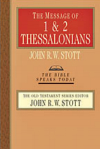
The Message of 1 & 2 Thessalonians
- Author: John Stott
- Publisher: IVP
- Publication Date: 1994
- Pages: 218
Digging into Paul’s letters to the Thessalonians, John R. W. Stott addresses issues of vital importance today:
- how the church spreads the gospel
- how Christians live according to the gospel
- how the gospel offers hope in the midst of trouble
Originally published as The Gospel & the End of Time, Stott’s comments on 1 and 2 Thessalonians are now available in Logos as a new addition to the Bible Speaks Today series.
John Stott is known worldwide as a preacher, evangelist and communicator of Scripture. For many years he served as rector of All Souls Church in London, where he carried out an effective urban pastoral ministry.
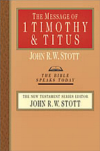
The Message of 1 Timothy & Titus
- Author: John Stott
- Publisher: IVP
- Publication Date: 2001
- Pages: 232
In the letters to Timothy and Titus, Paul focuses on the idea of inheritance. The faithful, he writes, must guard and deliver the inheritance of gospel truth. Nearing the end of his life, Paul is intent on securing the heritage of gospel truth for the next generation.
In this Bible Speaks Today volume (previously released under the title Guard the Truth), John Stott finds in 1 Timothy and Titus a dynamic truth that orders Christian life in the church, the family and the world. Here is the lucid commentary we have come to expect from Stott, ever faithful to the text and time of Paul's letters. But in a manner unique to Stott's role as a distinguished Christian statesman, this work's interpretive and pastoral voice remarkably echoes Paul for our own day. One generation speaks to another: "Guard the truth."
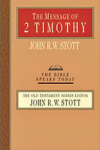
The Message of 2 Timothy
- Author: John Stott
- Publisher: IVP
- Publication Date: 1984
- Pages: 127
John Stott writes, "During the last five years I seem to have lived inside the second letter of Paul to Timothy. In imagination I have sat down beside Timothy and have tried myself to hear and heed this final charge from the aging apostle . . ."
"On each occasion I have been impressed afresh by the timeliness of today of what the apostle writes, especially for young Christian leaders. For our era is one of theological and moral confusion, even of apostasy. And the apostle summons us, as he summoned Timothy, to be strong, brave and steadfast."
John Stott is known worldwide as a preacher, evangelist and communicator of Scripture. For many years he served as rector of All Souls Church in London, where he carried out an effective urban pastoral ministry.
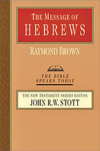
The Message of Hebrews
- Author: Raymond Brown
- Publisher: IVP
- Publication Date: 1984
- Pages: 311
Times were hard for the first readers of the letter to the Hebrews. Many had been exposed to fierce persecution. They had been assaulted, their homes had been plundered, and some had even been cast into prison.
To such people this letter came as an encouragement. The writer of the letter turns their eyes to Christ, shows how he fulfills the hope expressed in the Old Testament sacrifices, and calls his readers to a steadfast faith that will take them through the hard times they now face.
Such encouragement and challenge are never without relevance to Christians. Raymond Brown demonstrates this clearly in his passage-by-passage exposition.
Raymond Brown was formerly principal of Spurgeon's College in London, England, and he has also served in several pastorates.
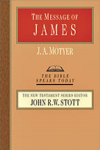
The Message of James
- Author: J. Alec Motyer
- Publisher: IVP
- Publication Date: 1985
- Pages: 214
As a good communicator, James addressed his readers directly and pointedly with vivid images from ordinary life and attention-gripping statements.
This rich exposition brings James's letter to life for today's reader. Alec Motyer is himself gripped by James's energy and concern for practical Christianity. The letter shows how a genuine faith is a tested faith, how encounter with difficulties is an essential part of the growth to Christian maturity this book powerfully brings out James's memorable themes--the link between enduring trials and maturity; the question of perfection; the good gifts of God; faith, works and Christian concern in a world of human need; the implications of careless and evil words; the meaning of war; the church and healing; confession of sin; and the need for active purity in life.
J. Alec Motyer (M.A., B.D., D.D.) was formerly principal of Trinity College in Bristol, England. He has extensive experience in parish ministry and is well known as a Bible expositor.

The Message of 1 Peter
- Author: Edmund P. Clowney
- Publisher: IVP
- Publication Date: 1989
- Pages: 250
The message of Peter's first letter turned the world upside-down for his readers. He saw the people of the young church of the first century as strangers, aliens who were only temporary residents, travelers heading for their native land.
Peter speaks to our own pilgrimage when he tells of suffering now and glory to come. Stormy seasons of persecution were beginning for the churches in Asian Minor. These storms rage on in the modern world.
Edmund Clowney believes that no true Christian can escape at least a measure of suffering for Christ's sake. Out of his firsthand knowledge as an apostle of Christ, Peter shows us what the story of Jesus' life means for us as we take up our cross and follow him.
Edmund P. Clowney (1917-2005) received his B.A. from Wheaton College in 1939, a Th.B. from Westminster Theological Seminary in 1942, an S.T.M. from Yale University Divinity School in 1944 and a D.D. from Wheaton College in 1966. He is remembered by many as a preacher, perhaps the most gifted proponent and practitioner of redemptive-historical preaching of this generation.
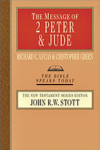
The Message of 2 Peter & Jude
- Authors: R.C. Lucas and Christopher Green
- Publisher: IVP
- Publication Date: 1995
- Pages: 270
The letters of 2 Peter and Jude are sometimes overlooked, yet their message for today's church is timely and compelling. Today, as in the first century, Christians must guard against false guides who lead young believers astray and cause divisions within the community of faith. Responding to this ever-present danger, 2 Peter and Jude equip readers to discern truth from illusion and exhort them to loyalty, harmony and spiritual maturity.
In this volume of the Bible Speaks Today series, Dick Lucas and Christopher Green offer passage-by-passage exposition of the letters of 2 Peter and Jude. They include introductory information on authorship, original audience, major themes and recent issues of scholarship, while focusing on the relevance of these two letters to contemporary Christian experience.
R.C. Lucas is rector of St. Helen's Church, Bishopsgate, London.
Christopher Green is vice principal at Oak Hill College, London. Previously he worked at three churches in the London area and is coauthor of The Message of 2 Peter and Jude and coedited a book on preaching entitled When God´s Voice Is Heard. He also edits the Oak Hill School of Theology volumes.
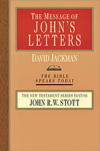
The Message of John's Letters
- Author: David Jackman
- Publisher: IVP
- Publication Date: 1988
- Pages: 214
Immorality is inundating the Christian community and gradually eroding the foundations of Christian living. The truth of God incarnate, the atonement and the bodily resurrection of Christ are under attack—even from within the church.
These are the concerns of Christians today, and they were the problems that faced the Christians of John's day. In a society that scorned the gospel and sneered at godly living, John encouraged Christians with a message forged from two words—truth and love.
In this contemporary retelling of John's message, David Jackman describes John's first letter as an upwardly spiraling staircase that circles and broadens out around the twin themes of truth and love, mind and heart, Word and Spirit. It is a message both timeless and timely for the church today
David Jackman is director of the Cornhill Training Course. A respected Bible teacher in Britain, he is also the author of Understanding the Church.

The Message of Revelation
- Author: Michael Wilcock
- Publisher: IVP
- Publication Date: 1984
- Pages: 240
What is the book of Revelation? Does it describe in veiled language events of its writer's own day, or is it largely a prophecy of events still to come? Is it a chart of the whole of history from Christ's first coming to his second? Or does it deal chiefly with principles which are always valid in Christian experience?
And what is a twentieth-century reader to do with creatures covered with eyes, locusts like horses, seven bowls of wrath, war in heaven, various beasts and a dragon?
Michael Wilcock maintains that when God's words, declarations, arguments and reasonings had all been spoken, God gave the church "a gorgeous picture book." Wilcok lifts the curtain on Revelation's drama in eight scenes, helping our imaginations as well as our minds grasp the key concepts of this fascinating and enigmatic New Testament book.
Michael Wilcock was formerly director of pastoral studies at Trinity College, Bristol. He has now also retired from many years of pastoring churches in the United Kingdom, most recently St. Nicholas' Church, Durham.
John Stott is known worldwide as a preacher, evangelist and communicator of Scripture. For many years he served as rector of All Souls Church in London, where he carried out an effective urban pastoral ministry.
J. Alec Motyer (M.A., B.D., D.D.) was formerly principal of Trinity College in Bristol, England. He has extensive experience in parish ministry and is well known as a Bible expositor.
Reviews
69 ratings
Ken McClurkin
2/9/2025

Craig Stephens
12/28/2021
I purchased this commentary set as part of the Logos 8 Anglican Legacy Library. I am disappointed to find that it doesn't index as a commentary. This series cannot be prioritized as a resource. Volumes can only be opened from the library section. I am hoping that the staff will see this message and the similar message from another person on here and look in to fixing this issue. Thanks.
Randy
3/29/2020
Oddly, these commentaries are not indexed under either "The Bible Speaks Today", or "BST". The only way to get them to come up in a search, is to put type:commentary subject:message of. I manually tagged them with BST to make them easier to find. While I don't have a great deal of experience with these commentaries yet, I did review the comments on 1 Peter 3 and 1 Timothy 2:11-15. Passages that deal with the roles of men and women are usually a pretty good barometer of whether the commentary is going to be faithful to the word of God, or cave in to worldly culture and political correctness. Both volumes were spot on, accepting what the passages clearly teach, and rejecting the feminist, politically correct revision that seeks to erase any distinction between male and female roles. The 1 Corinthians volume was a little troubling in how it interpreted 14:34-35. After citing the Scripture that says, "Women should remain silent in the churches. They are not allowed to speak, but must be in submission, as the law says. If they want to inquire about something, they should ask their own husbands at home; for it is disgraceful for a woman to speak in the church", it immediately concludes, "Whatever this section is teaching, it is not telling women to keep quiet in church". It then basically ignores the text, and formulates it's interpretation from what other passages say, without finding any convincing harmony between the two. I find that a bit troubling, hence the four stars. David Prior, The Message of 1 Corinthians: Life in the Local Church, The Bible Speaks Today (Leicester, England; Downers Grove, IL: InterVarsity Press, 1985), 251–252.Markus Buller
12/21/2019
唐汉森
1/24/2019
Dwayne Campbell
9/27/2018

Fred Robbins
6/29/2017
Blake L. Dameron
2/14/2017